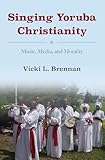Singing Yoruba Christianity : music, media, and morality / Vicki L. Brennan.
Material type: TextSeries: African expressive culturesPublisher: Bloomington : Indiana University Press, 2018Description: 1 online resourceContent type:
TextSeries: African expressive culturesPublisher: Bloomington : Indiana University Press, 2018Description: 1 online resourceContent type: - 9780253032089
- 0253032083
- Cherubim and Seraphim Church Movement
- Cherubim and Seraphim Church Movement
- Yoruba (African people) -- Nigeria -- Lagos -- Religion
- Yoruba (African people) -- Nigeria -- Lagos -- Music -- History and criticism
- Singing -- Social aspects -- Nigeria -- Lagos
- Singing -- Religious aspects -- Christianity
- Church music -- Nigeria -- Lagos
- Yoruba (Peuple d'Afrique) -- Nigeria -- Lagos -- Religion
- Chant -- Aspect social -- Nigeria -- Lagos
- Chant -- Aspect religieux -- Christianisme
- Musique d'église -- Nigeria -- Lagos
- MUSIC -- Instruction & Study -- Voice
- MUSIC -- Lyrics
- MUSIC -- Printed Music -- Vocal
- RELIGION -- Christian Rituals & Practice -- General
- Church music
- Singing -- Religious aspects -- Christianity
- Yoruba (African people)
- Yoruba (African people) -- Religion
- Nigeria -- Lagos
- 782.2209669 23
- ML3151.N547 L34 2018
- online - EBSCO
| Item type | Current library | Call number | URL | Status | Notes | Barcode | |
|---|---|---|---|---|---|---|---|
 eBook
eBook
|
Biblioteca "Angelicum" Pont. Univ. S.Tommaso d'Aquino Nuvola online | online - EBSCO (Browse shelf(Opens below)) | Online access | Not for loan (Accesso limitato) | Accesso per gli utenti autorizzati / Access for authorized users | (ebsco)1682502 |
Singing the same song -- Onward Christian soldiers -- The voice of the Spirit -- Take control -- Straight to Heaven -- In His steps -- Living in the Spirit -- Show the glory of God.
Includes bibliographical references and index.
Singing the same song is a central part of the worship practice for members of the Cherubim and Seraphim Christian Church in Lagos, Nigeria. Vicki L. Brennan reveals that by singing together, church members create one spiritual mind and become unified around a shared set of values. She follows parishioners as they attend choir rehearsals, use musical media'hymn books and cassette tapes'and perform the music and rituals that connect them through religious experience. Brennan asserts that church members believe that singing together makes them part of a larger imagined social collective, one that allows them to achieve health, joy, happiness, wealth, and success in an ethical way. Brennan discovers how this particular Yoruba church articulates and embodies the moral attitudes necessary to be a good Christian in Nigeria today.


